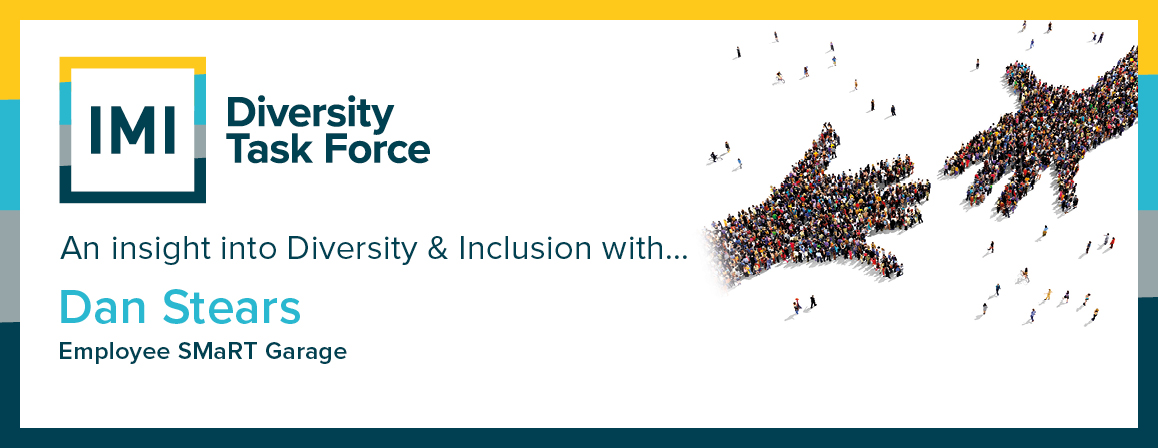Case Study: Dan Stears

This case study attempts to use terminology that is acceptable to under-represented groups, but we appreciate that some of what is written may be problematic. For this we apologise. As with many others, we are on a learning journey and hope that you will bear with us as we move forward together.
Name: Dan Stears
Role/Company: Employee/SMaRT Garage
Tell us what it was like when you first started.
When I first was given the option to volunteer at FST, I was 31, was in recovery from my third mental breakdown and looking to start working a few days a week, in order to get myself back in a position to be able to work full time whilst dealing with both Anxiety and PTSD.
I was very unsure as historically the Automotive Industry has had a reputation for being a very male dominant, testosterone driven, anti-inclusive workplace. As someone who belongs to part of the LGBTQ+ community, this worried me. However, I took the opportunity presented to me by my support worker at the time and I can honestly say the team at FST were accepting and welcoming. Before starting I was given a tour of the garage and met the team, was able to ask questions and then given a few days to think if it was the right decision for me. The atmosphere at the garage felt good and the staff took time to explain FST’s approach and how I could be open about my situation. Although still anxious I felt at ease enough, and this gave me the confidence to take give it a go despite my previous experiences.
Tell us about your first role and your career progression.
On my first day, I was welcomed by both the Garage and the Office Managers, Simon and Craig, I was measured for the uniform and was talked through the safety policies and my responsibilities, we spoke about my concerns, where my level of knowledge of the trade sat and where I wanted to aim for. Given my anxiety, I thought it best to start with something I felt at ease doing, which was working in the office taking bookings and learning about GDS (Garage Data Systems) and customer service. For the first few weeks, I came in on different days so that I could pair up with another member of staff who would be working on the days that I didn’t, so she could mentor me on procedures and how to deal with paperwork. I was given the training manuals for the procedures and asked to make myself familiar with them. However, with a background in training, I noticed that they could be improved upon and asked if I could rewrite a few of them. To my surprise, they said yes. I went away and rewrote a few of the manuals to make them more engaging, more visual and less text heavy. Eight years later, as far as I’m aware, they still use those manuals across all sites of FST.
Tell us about your current role.
My main role within FST was front of house, mainly customer facing, but also dealing with finance, admin, etc. When I first started, I really struggled with interacting with people I didn’t know. So being part of the front of house team, I would shy away from public interactions, but slowly over time, my colleagues gently edged me into being more confident in the work I was doing, being able to successfully navigate the systems, answering customer questions and liaising between the garage team seeking update on customer jobs whilst confidently being able to relay information back to the customer.
When we weren’t so busy, I would occasionally try different roles within the garage, from ordering parts, to doing services on cars, with mentoring by other members of the garage team.
FST also ran a course called Driving Ambition, where they would help those with mental health conditions pass their theory test in order to gain their full driving licence, which I became part of the team that did the training course. Not only did they help gain my confidence back in my previous career, they also allowed me to gain confidence in areas of work I would never have previously considered.
Tell us about your inspiration
Progression is vastly important within a business for a few reasons. Firstly, for someone to progress, it means you need to invest in them. Investing in an employee's growth promotes the feeling of being valued by your employer. Secondly it promotes loyalty from your employee, which reduces staff turnover. Finally, it encourages confidence within the employee that they are able to do their job to the highest standard, which in turn gives confidence to the customer that your business cares.
Examples of good practice?
I believe that FST’s core values and philosophy is an example of good practice. It’s not rocket science it’s about recognising that severe mental health problems can happen to anyone at any time. FST recognises that you’re going to feel really low in confidence and self-esteem, that may initially struggle with things and people. However, it’s not a soft option. FST expect you to do your best, to try your hardest at all times despite the challenges and frustrations you face just getting out of bed. They treat you as an asset and are willing to invest time and energy into making you feel comfortable. They recognise that given time and a bit of space people get well and become stronger in their determination to succeed. They retain that small business ethos of looking after everyone. Being treated as someone with something to offer (an asset) is a strong driver when your baseline feelings and frustrations have been low for a very long time.
What are your views on diversity and inclusion?
Within the industry, I’m unaware of any particular industry networks (LGBTQ+, LD, EDI, etc.) However, for FST, I can very confidently say that Equality, Diversity and Inclusion was built in to the fabric of the organisation and was aware of many different sub-sections of society represented including the Trans and Jewish Communities. Even outside the Automotive sector, I rarely come across such diversity within a company. This doesn’t mean the sector as a whole is in the same boat as FST, it just means that FST is shining example of what other sector companies need to be aiming towards. To do that, it needs buy in from everyone, not just management.
Is the automotive sector as a whole doing enough to champion diversity and inclusion?
Not at all, but I don’t think this statement is exclusive to just the automotive Sector.
What do you think needs to change to enable the automotive industry to be more diverse?
As I’ve previously stated, the automotive sector seems to suffer from an image problem when it comes to recruiting from under represented sections of society. It’s good to hear that the IMI is taking a lead in the area. We all need to be more open and welcoming
What personal insight do you want to share to enable other people to understand what it’s like for you working in the automotive industry.
As someone who deals with having an enduring mental health condition, I need people to understand that I have both good and bad days. On a good day I’m more competent than most in the work that I do. However, on a bad day, I have to work twice as hard to get even the simplest of tasks done and that’s even before I step foot into the office. I might take more days off that your average worker, But I will more than make up for it when I’m in a good place with my mental health.
I need them to talk to me about my mental health to me so that I can have an honest conversation about how it may sometimes affect my work, so that when it does, I don’t feel the guilt of underperforming on top of everything else.
Finally, I need to feel like they have my back when I’m unwell. Because if I feel that, it makes the process of getting better so much easier.
Having that conversation helps the employer to understand what things to look out for to indicate that I might be on a downwards slope. A lot of the time, it is something I will not notice myself until after the event.




